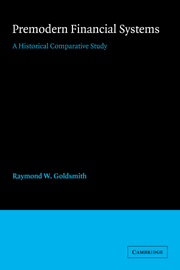Book contents
- Frontmatter
- Contents
- List of tables
- Preface
- 1 Introduction
- 2 The financial systems of the ancient Near East
- 3 The financial system of Periclean Athens
- 4 The financial system of Augustan Rome
- 5 The financial system of the early Abbasid caliphate
- 6 The financial system of the Ottoman Empire at the death of Suleiman I
- 7 The financial system of Mughal India at the death of Akbar
- 8 The financial system of early Tokugawa Japan
- 9 The financial system of Medici Florence
- 10 The financial system of Elizabethan England
- 11 The financial system of the United Provinces at the Peace of Münster
- 12 Similarities and differences
- Notes
- Bibliography
- Index
11 - The financial system of the United Provinces at the Peace of Münster
Published online by Cambridge University Press: 05 March 2012
- Frontmatter
- Contents
- List of tables
- Preface
- 1 Introduction
- 2 The financial systems of the ancient Near East
- 3 The financial system of Periclean Athens
- 4 The financial system of Augustan Rome
- 5 The financial system of the early Abbasid caliphate
- 6 The financial system of the Ottoman Empire at the death of Suleiman I
- 7 The financial system of Mughal India at the death of Akbar
- 8 The financial system of early Tokugawa Japan
- 9 The financial system of Medici Florence
- 10 The financial system of Elizabethan England
- 11 The financial system of the United Provinces at the Peace of Münster
- 12 Similarities and differences
- Notes
- Bibliography
- Index
Summary
The United Provinces in the seventeenth century are remarkable from an economic point of view for two reasons. The first is that a small country of hardly 2 million, or 2 percent of the population of Europe and 0.4 percent of that of the world (McEvedy and Jones, vol. 18, p. 342), should have become, even if only for a short period – essentially in the second and third quarter of the century – the center of the international economy, the owner of by far the largest and the most efficient of the world's high-sea fleets, the most important staple market for commodities and for precious metals, the initiator of many advances in commercial and financial as well as in agricultural and manufacturing techniques, and the possessor of the strongest navy and of an important colonial empire, though to speak of a Dutch “hegemony” is an exaggeration. The second reason is that this episode constitutes the last case – Venice, Florence, Genova, Brugge, and Antwerp were earlier examples – of a single city being able to play such a role – Amsterdam with less than 200,000 inhabitants representing something like one-half of the economic power of the United Provinces (Barbour, p. 13, reiterated by Braudel, p. 145).
- Type
- Chapter
- Information
- Premodern Financial SystemsA Historical Comparative Study, pp. 198 - 228Publisher: Cambridge University PressPrint publication year: 1987



